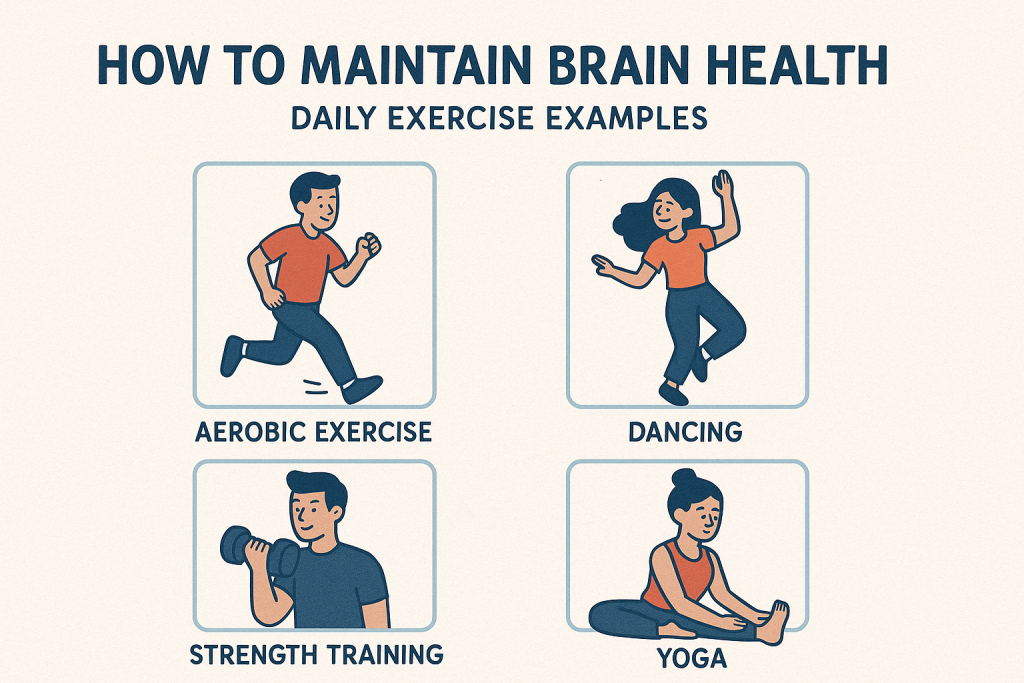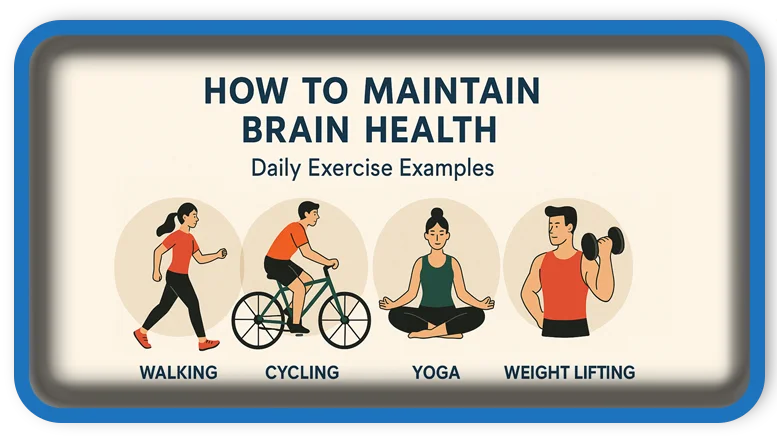⏲️ Estimated reading time: 5 min
Brain Health Daily Exercise Examples. Boost your brainpower with daily exercises designed to improve memory, focus, and cognitive function. Discover simple yet effective activities you can add to your daily routine for better mental sharpness and long-term brain health.
Brain Health Daily Exercise Examples: Improve Your Mind Every Day
Maintaining a healthy brain isn’t just about genetics or aging gracefully it’s about what you do daily. Just like physical fitness, your brain needs regular stimulation to stay sharp, flexible, and strong. In this article, we explore the best daily exercises for brain health that you can integrate easily into your routine.
Why Is Brain Health Important?
Brain health refers to the ability to remember, learn, play, concentrate, and maintain a clear, active mind. It’s crucial for emotional regulation, decision-making, and social interaction. As we age, brain functions can decline, but daily mental exercises can significantly slow down this process.
Keeping your brain active improves neuroplasticity the brain’s ability to form and reorganize synaptic connections, especially in response to learning or experience. This is vital in preventing neurodegenerative diseases like Alzheimer’s and Parkinson’s.
Benefits of Daily Brain Exercises
Before diving into specific examples, here are a few science-backed benefits of daily brain training:
- Enhanced memory and recall
- Improved focus and concentration
- Reduced risk of cognitive decline
- Increased mental clarity and creativity
- Better emotional balance and stress management
Now, let’s explore practical daily exercises that can contribute to a healthy and thriving brain.

1. Morning Mental Warm-Up: Crossword or Sudoku
Starting your day with a puzzle is like doing a brain warm-up. Crosswords, Sudoku, or word searches challenge your brain to recall vocabulary, patterns, and logic. This helps stimulate the hippocampus, the area responsible for memory.
How to Practice:
- Spend 10–15 minutes on a puzzle every morning.
- Use apps like Lumosity, Elevate, or a classic newspaper.
2. Learn Something New Every Day
The brain thrives on novelty. Whether it’s a new word, a fun fact, or a skill like origami or juggling, learning challenges your brain to create new pathways.
Ideas:
- Subscribe to a “word of the day” newsletter.
- Learn basic phrases in a new language.
- Watch a YouTube tutorial on a new craft or recipe.
3. Physical Exercise with a Brain Boost
Physical activity increases blood flow to the brain and supports the growth of new brain cells, especially in the hippocampus.
Best Brain-Boosting Exercises:
- Brisk walking or jogging (30 minutes)
- Dance routines (improve coordination and memory)
- Yoga and tai chi (enhance focus and reduce stress)
Bonus: Try learning new dance moves or changing your walking route to add a cognitive twist.
4. Mindfulness and Meditation
Meditation isn’t just for stress relief it’s also a powerhouse for brain health. Studies show that mindfulness increases gray matter in the brain and improves focus, memory, and emotional control.
Daily Practice:
- Meditate for 10 minutes in the morning or before bed.
- Use guided meditation apps like Headspace or Calm.
- Try breathing exercises such as box breathing or alternate nostril breathing.
5. Journaling for Clarity
Writing engages multiple brain areas and helps consolidate memory, reduce anxiety, and improve emotional regulation.
Journal Prompts:
- “What did I learn today?”
- “What am I grateful for?”
- “What challenge did I overcome recently?”
Even writing down your dreams, goals, or a to-do list can provide mental clarity.
6. Social Interaction
Conversation and human connection stimulate cognitive functions and help ward off depression, which is often linked to cognitive decline.
How to Engage:
- Call or meet a friend or family member daily.
- Join clubs or community groups.
- Engage in group games like trivia or board games.
7. Read Fiction or Nonfiction
Reading increases empathy, improves memory, and strengthens neural connections. Whether it’s fiction or nonfiction, exposing your brain to complex narratives or new knowledge keeps it sharp.
Reading Goals:
- 10–20 minutes of reading daily
- Try audiobooks during a commute or walk
8. Play a Musical Instrument
Music is a full-brain workout. It enhances auditory processing, coordination, memory, and emotional intelligence.
Easy to Start:
- Learn basic piano or guitar chords
- Use apps like Yousician or Simply Piano
- Practice for 10–15 minutes daily
Even listening actively to music and identifying instruments or rhythms boosts your auditory and memory skills.
9. Brain Training Apps and Games
There are plenty of mobile apps designed specifically to challenge your cognitive abilities.
Top Picks:
- Lumosity: Personalized brain training
- Peak: Focus and problem-solving exercises
- CogniFit: Measures and enhances various brain skills
Use them in moderation around 10–20 minutes per day.
10. Change Up Your Routine
Doing things differently forces your brain to adapt and think creatively.
Ideas to Switch It Up:
- Brush your teeth with your non-dominant hand
- Take a different route to work
- Rearrange your workspace
- Cook a new recipe without instructions
These small challenges improve cognitive flexibility and problem-solving skills.
A Sample Daily Brain Health Routine
Here’s how you could integrate these exercises into your day:
- Morning: 10-minute meditation + crossword puzzle
- Midday: 30-minute walk or yoga session
- Afternoon: Learn a new word or skill (10 mins)
- Evening: Journal + 15 minutes of reading
- Weekly goals: Play music, socialize, and switch routines
Final Thoughts
Daily brain health exercises don’t have to be complex or time-consuming. By incorporating small, consistent activities into your lifestyle, you can significantly boost cognitive function, emotional balance, and overall mental well-being. Your brain, like any muscle, thrives on challenges and variety so keep it curious, engaged, and growing.
🏷️ Tags: brain health, daily routine, mental exercises, cognitive function, memory improvement, mindfulness, learning habits, healthy lifestyle, brain training, personal development
Only logged-in users can submit reports.
Discover more from HelpZone
Subscribe to get the latest posts sent to your email.

